Zijin Hong
Graph-based Agent Memory: Taxonomy, Techniques, and Applications
Feb 05, 2026Abstract:Memory emerges as the core module in the Large Language Model (LLM)-based agents for long-horizon complex tasks (e.g., multi-turn dialogue, game playing, scientific discovery), where memory can enable knowledge accumulation, iterative reasoning and self-evolution. Among diverse paradigms, graph stands out as a powerful structure for agent memory due to the intrinsic capabilities to model relational dependencies, organize hierarchical information, and support efficient retrieval. This survey presents a comprehensive review of agent memory from the graph-based perspective. First, we introduce a taxonomy of agent memory, including short-term vs. long-term memory, knowledge vs. experience memory, non-structural vs. structural memory, with an implementation view of graph-based memory. Second, according to the life cycle of agent memory, we systematically analyze the key techniques in graph-based agent memory, covering memory extraction for transforming the data into the contents, storage for organizing the data efficiently, retrieval for retrieving the relevant contents from memory to support reasoning, and evolution for updating the contents in the memory. Third, we summarize the open-sourced libraries and benchmarks that support the development and evaluation of self-evolving agent memory. We also explore diverse application scenarios. Finally, we identify critical challenges and future research directions. This survey aims to offer actionable insights to advance the development of more efficient and reliable graph-based agent memory systems. All the related resources, including research papers, open-source data, and projects, are collected for the community in https://github.com/DEEP-PolyU/Awesome-GraphMemory.
Macro Graph of Experts for Billion-Scale Multi-Task Recommendation
Jun 12, 2025Abstract:Graph-based multi-task learning at billion-scale presents a significant challenge, as different tasks correspond to distinct billion-scale graphs. Traditional multi-task learning methods often neglect these graph structures, relying solely on individual user and item embeddings. However, disregarding graph structures overlooks substantial potential for improving performance. In this paper, we introduce the Macro Graph of Expert (MGOE) framework, the first approach capable of leveraging macro graph embeddings to capture task-specific macro features while modeling the correlations between task-specific experts. Specifically, we propose the concept of a Macro Graph Bottom, which, for the first time, enables multi-task learning models to incorporate graph information effectively. We design the Macro Prediction Tower to dynamically integrate macro knowledge across tasks. MGOE has been deployed at scale, powering multi-task learning for the homepage of a leading billion-scale recommender system. Extensive offline experiments conducted on three public benchmark datasets demonstrate its superiority over state-of-the-art multi-task learning methods, establishing MGOE as a breakthrough in multi-task graph-based recommendation. Furthermore, online A/B tests confirm the superiority of MGOE in billion-scale recommender systems.
When to use Graphs in RAG: A Comprehensive Analysis for Graph Retrieval-Augmented Generation
Jun 06, 2025Abstract:Graph retrieval-augmented generation (GraphRAG) has emerged as a powerful paradigm for enhancing large language models (LLMs) with external knowledge. It leverages graphs to model the hierarchical structure between specific concepts, enabling more coherent and effective knowledge retrieval for accurate reasoning.Despite its conceptual promise, recent studies report that GraphRAG frequently underperforms vanilla RAG on many real-world tasks. This raises a critical question: Is GraphRAG really effective, and in which scenarios do graph structures provide measurable benefits for RAG systems? To address this, we propose GraphRAG-Bench, a comprehensive benchmark designed to evaluate GraphRAG models onboth hierarchical knowledge retrieval and deep contextual reasoning. GraphRAG-Bench features a comprehensive dataset with tasks of increasing difficulty, coveringfact retrieval, complex reasoning, contextual summarization, and creative generation, and a systematic evaluation across the entire pipeline, from graph constructionand knowledge retrieval to final generation. Leveraging this novel benchmark, we systematically investigate the conditions when GraphRAG surpasses traditional RAG and the underlying reasons for its success, offering guidelines for its practical application. All related resources and analyses are collected for the community at https://github.com/GraphRAG-Bench/GraphRAG-Benchmark.
Knapsack Optimization-based Schema Linking for LLM-based Text-to-SQL Generation
Feb 18, 2025Abstract:Generating SQLs from user queries is a long-standing challenge, where the accuracy of initial schema linking significantly impacts subsequent SQL generation performance. However, current schema linking models still struggle with missing relevant schema elements or an excess of redundant ones. A crucial reason for this is that commonly used metrics, recall and precision, fail to capture relevant element missing and thus cannot reflect actual schema linking performance. Motivated by this, we propose an enhanced schema linking metric by introducing a restricted missing indicator. Accordingly, we introduce Knapsack optimization-based Schema Linking Agent (KaSLA), a plug-in schema linking agent designed to prevent the missing of relevant schema elements while minimizing the inclusion of redundant ones. KaSLA employs a hierarchical linking strategy that first identifies the optimal table linking and subsequently links columns within the selected table to reduce linking candidate space. In each linking process, it utilize a knapsack optimization approach to link potentially relevant elements while accounting for a limited tolerance of potential redundant ones.With this optimization, KaSLA-1.6B achieves superior schema linking results compared to large-scale LLMs, including deepseek-v3 with state-of-the-art (SOTA) schema linking method. Extensive experiments on Spider and BIRD benchmarks verify that KaSLA can significantly improve the SQL generation performance of SOTA text-to-SQL models by substituting their schema linking processes.
Benchmarking Large Language Models via Random Variables
Jan 20, 2025Abstract:With the continuous advancement of large language models (LLMs) in mathematical reasoning, evaluating their performance in this domain has become a prominent research focus. Recent studies have raised concerns about the reliability of current mathematical benchmarks, highlighting issues such as simplistic design and potential data leakage. Therefore, creating a reliable benchmark that effectively evaluates the genuine capabilities of LLMs in mathematical reasoning remains a significant challenge. To address this, we propose RV-Bench, a framework for Benchmarking LLMs via Random Variables in mathematical reasoning. Specifically, the background content of a random variable question (RV question) mirrors the original problem in existing standard benchmarks, but the variable combinations are randomized into different values. LLMs must fully understand the problem-solving process for the original problem to correctly answer RV questions with various combinations of variable values. As a result, the LLM's genuine capability in mathematical reasoning is reflected by its accuracy on RV-Bench. Extensive experiments are conducted with 29 representative LLMs across 900+ RV questions. A leaderboard for RV-Bench ranks the genuine capability of these LLMs. Further analysis of accuracy dropping indicates that current LLMs still struggle with complex mathematical reasoning problems.
HNCSE: Advancing Sentence Embeddings via Hybrid Contrastive Learning with Hard Negatives
Nov 19, 2024
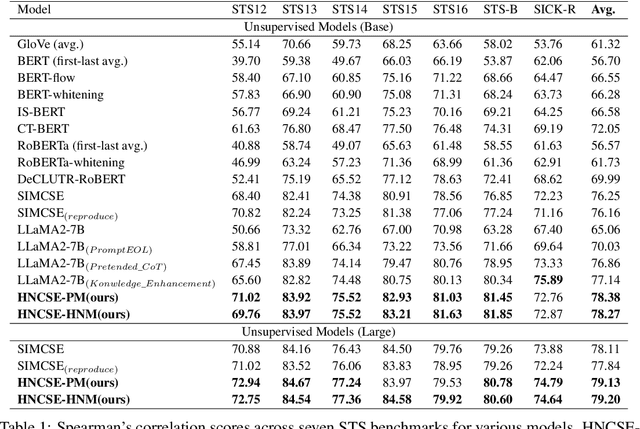
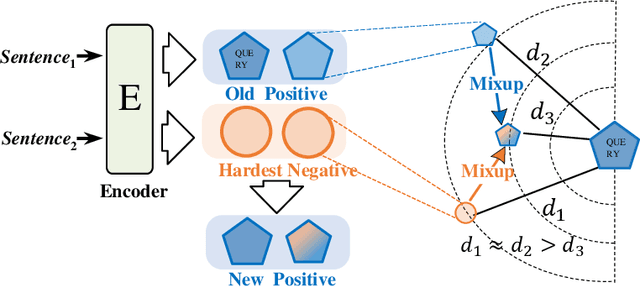
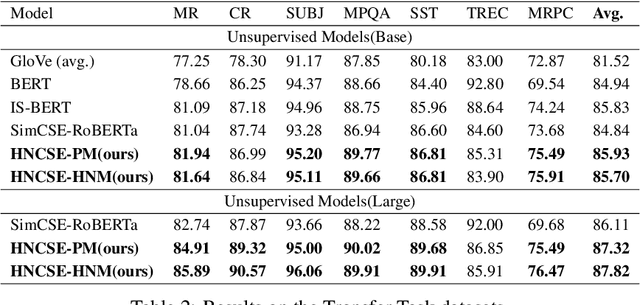
Abstract:Unsupervised sentence representation learning remains a critical challenge in modern natural language processing (NLP) research. Recently, contrastive learning techniques have achieved significant success in addressing this issue by effectively capturing textual semantics. Many such approaches prioritize the optimization using negative samples. In fields such as computer vision, hard negative samples (samples that are close to the decision boundary and thus more difficult to distinguish) have been shown to enhance representation learning. However, adapting hard negatives to contrastive sentence learning is complex due to the intricate syntactic and semantic details of text. To address this problem, we propose HNCSE, a novel contrastive learning framework that extends the leading SimCSE approach. The hallmark of HNCSE is its innovative use of hard negative samples to enhance the learning of both positive and negative samples, thereby achieving a deeper semantic understanding. Empirical tests on semantic textual similarity and transfer task datasets validate the superiority of HNCSE.
CLR-Bench: Evaluating Large Language Models in College-level Reasoning
Oct 23, 2024



Abstract:Large language models (LLMs) have demonstrated their remarkable performance across various language understanding tasks. While emerging benchmarks have been proposed to evaluate LLMs in various domains such as mathematics and computer science, they merely measure the accuracy in terms of the final prediction on multi-choice questions. However, it remains insufficient to verify the essential understanding of LLMs given a chosen choice. To fill this gap, we present CLR-Bench to comprehensively evaluate the LLMs in complex college-level reasoning. Specifically, (i) we prioritize 16 challenging college disciplines in computer science and artificial intelligence. The dataset contains 5 types of questions, while each question is associated with detailed explanations from experts. (ii) To quantify a fair evaluation of LLMs' reasoning ability, we formalize the criteria with two novel metrics. Q$\rightarrow$A is utilized to measure the performance of direct answer prediction, and Q$\rightarrow$AR effectively considers the joint ability to answer the question and provide rationale simultaneously. Extensive experiments are conducted with 40 LLMs over 1,018 discipline-specific questions. The results demonstrate the key insights that LLMs, even the best closed-source LLM, i.e., GPT-4 turbo, tend to `guess' the college-level answers. It shows a dramatic decrease in accuracy from 63.31% Q$\rightarrow$A to 39.00% Q$\rightarrow$AR, indicating an unsatisfactory reasoning ability.
Unconstrained Model Merging for Enhanced LLM Reasoning
Oct 17, 2024



Abstract:Recent advancements in building domain-specific large language models (LLMs) have shown remarkable success, especially in tasks requiring reasoning abilities like logical inference over complex relationships and multi-step problem solving. However, creating a powerful all-in-one LLM remains challenging due to the need for proprietary data and vast computational resources. As a resource-friendly alternative, we explore the potential of merging multiple expert models into a single LLM. Existing studies on model merging mainly focus on generalist LLMs instead of domain experts, or the LLMs under the same architecture and size. In this work, we propose an unconstrained model merging framework that accommodates both homogeneous and heterogeneous model architectures with a focus on reasoning tasks. A fine-grained layer-wise weight merging strategy is designed for homogeneous models merging, while heterogeneous model merging is built upon the probabilistic distribution knowledge derived from instruction-response fine-tuning data. Across 7 benchmarks and 9 reasoning-optimized LLMs, we reveal key findings that combinatorial reasoning emerges from merging which surpasses simple additive effects. We propose that unconstrained model merging could serve as a foundation for decentralized LLMs, marking a notable progression from the existing centralized LLM framework. This evolution could enhance wider participation and stimulate additional advancement in the field of artificial intelligence, effectively addressing the constraints posed by centralized models.
Next-Generation Database Interfaces: A Survey of LLM-based Text-to-SQL
Jun 12, 2024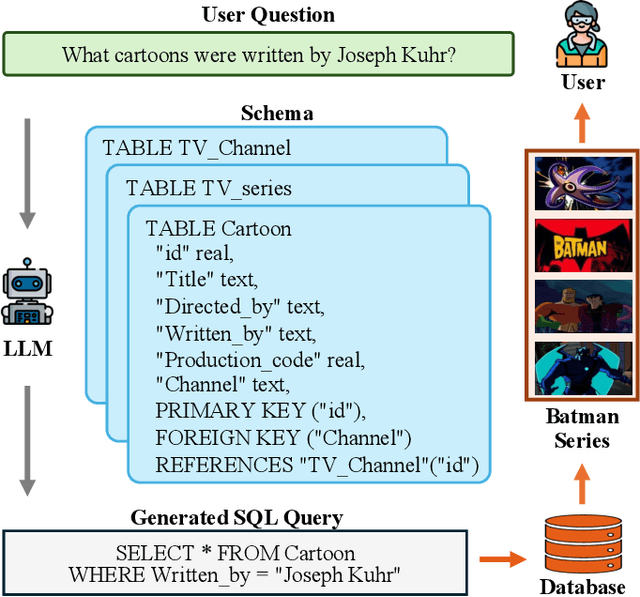

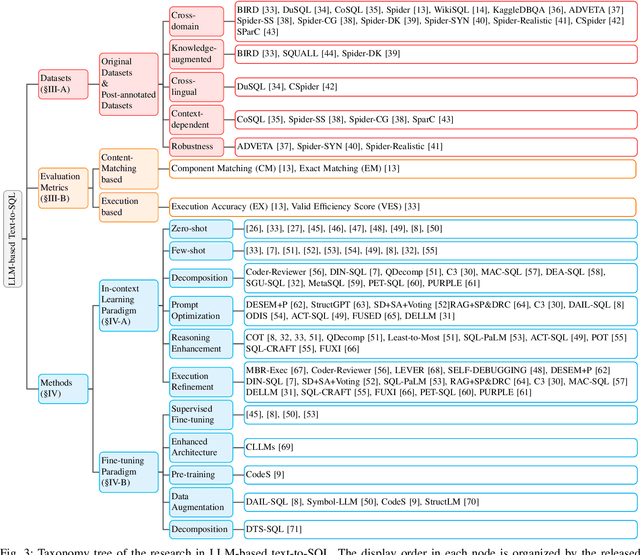
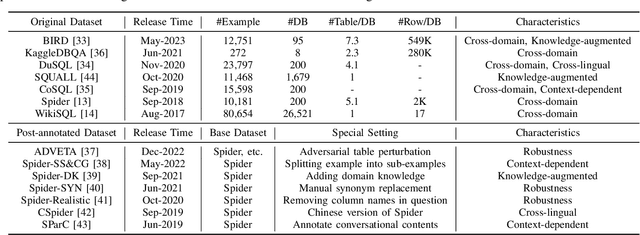
Abstract:Generating accurate SQL according to natural language questions (text-to-SQL) is a long-standing problem since it is challenging in user question understanding, database schema comprehension, and SQL generation. Conventional text-to-SQL systems include human engineering and deep neural networks. Subsequently, pre-trained language models (PLMs) have been developed and utilized for text-to-SQL tasks, achieving promising performance. As modern databases become more complex and corresponding user questions more challenging, PLMs with limited comprehension capabilities can lead to incorrect SQL generation. This necessitates more sophisticated and tailored optimization methods, which, in turn, restricts the applications of PLM-based systems. Most recently, large language models (LLMs) have demonstrated significant abilities in natural language understanding as the model scale remains increasing. Therefore, integrating the LLM-based implementation can bring unique opportunities, challenges, and solutions to text-to-SQL research. In this survey, we present a comprehensive review of LLM-based text-to-SQL. Specifically, we propose a brief overview of the current challenges and the evolutionary process of text-to-SQL. Then, we provide a detailed introduction to the datasets and metrics designed to evaluate text-to-SQL systems. After that, we present a systematic analysis of recent advances in LLM-based text-to-SQL. Finally, we discuss the remaining challenges in this field and propose expectations for future directions.
Towards Better Question Generation in QA-Based Event Extraction
May 17, 2024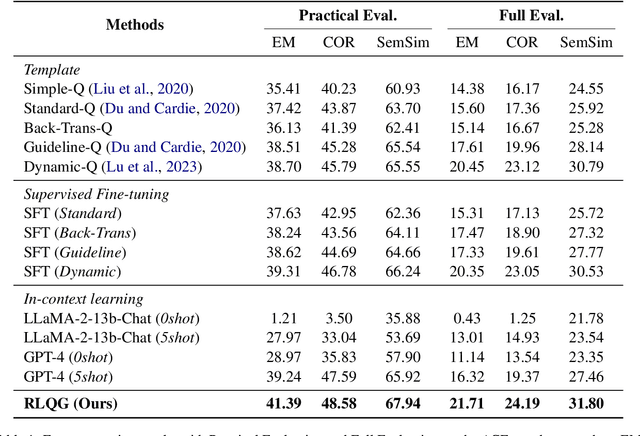
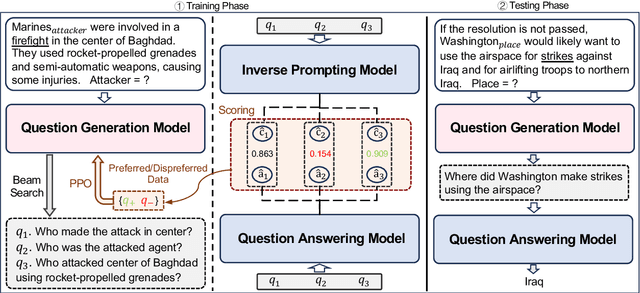

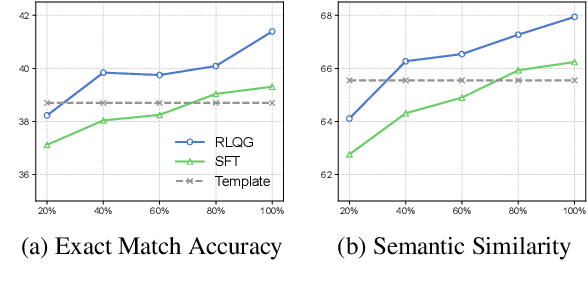
Abstract:Event Extraction (EE) is an essential information extraction task that aims to extract event-related information from unstructured texts. The paradigm of this task has shifted from conventional classification-based methods to more contemporary question-answering (QA)-based approaches. However, in QA-based EE, the questions' quality dramatically affects the extraction accuracy, and how to generate high-quality questions for QA-based EE still remains a challenge. In this work, to tackle this challenge, we suggest four criteria to evaluate the quality of a question and propose a reinforcement learning method for QA-Based EE that can generate fluent, generalizable, and context-dependent questions and provides clear guidance to QA models. The extensive experiments conducted on ACE and RAMS datasets have strongly validated our approach's effectiveness, which also demonstrates its robustness in scenarios with limited training data.
 Add to Chrome
Add to Chrome Add to Firefox
Add to Firefox Add to Edge
Add to Edge